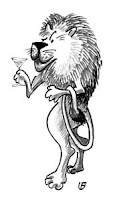 A Salonlöwe ("lounge lion") is a socialite displaying more style than substance (all that attention paid to hair!). Eine Person, die zwar sehr elegant und gebildet, aber auch sehr oberflächlich ist ("a person who is very elegant and well-educated, but also very shallow") is one definition I found on the web.
A Salonlöwe ("lounge lion") is a socialite displaying more style than substance (all that attention paid to hair!). Eine Person, die zwar sehr elegant und gebildet, aber auch sehr oberflächlich ist ("a person who is very elegant and well-educated, but also very shallow") is one definition I found on the web. It's tempting to compare the German animal to the English "lounge lizard", but I have the sense that the German expression does not connote a slithering parasite, a gigolo who lives off women, which the English definitions of "lounge lizard" stress.
[Source: Wild Things in the German Language: Kindle version | iBook version]
Happy New Year to all my friends!



9 comments:
Hi Ulrich, I have to think about the English equivalent if there is one--I was thinking of "social lion" but clearly that is quite different--but the drawing, the drawing is just wonderful, from that tail draped over the arm to the raised eyebrow, what a perfect addition to the definition of the word. More soon after I think about the word more. As a person, I see George Hamilton playing the role of a lounge lion. Come to think of it, I think he played a role in a movie called "The Young Lions," but I think he played a serious social lion not a lounge lion.
@Marlene: Thx. And I agree, George Hamilton fits perfectly, at least in terms of the look he cultivates--a Salonlöwe would (try to) look like he.
Ulrich, The lounge lion is superb. Until I read what you said about the English "lounge lizard," I thought that it must be the German equivalent and that, therefore, your lion might be a little too refined. But it's just right: elegant, haughty, and vain. How you are able to suggest that with details like the facial expression, the tail flung casually but really "just so" over the arm, and the position of each paw, I don't know! (Or am I reading the wrong things into it?) In any case, it's a beauty. I love the word itself too.
Happy New Year to you too!
@Esther: Thanks to you, too. I'm glad people are able to see what I wanted to express.
This creature reminds me of an actual person with whom I was once acquainted. This man was not only ein Salonlöwe, but also ein Luftmensch. I agree with everyone else that your drawings are just wonderful.
@miriam b: Thank you! The plan is to have every 2nd month an illustrated WOM--I'm getting into it.
@miriam b:interesting word, Luftmensch,sounds very german but is not known in general parlance, could it be Yiddish?? A latinized version used in the german language is Luftikus,- Other synonyms are Windhund or Windbeutel but none of them has the classy touch of a Salonlöwe.
@: Ulrich,I like your drawings and I could imagine a Windhund drawn in the same manner.
@mick: Yes, Luftmensch is Yiddish. The way I presented it may have been misleading. It shouldn't have been capitalized and would more accurately be written "a luftmensh". But I'm no expert.
The meaning of the word is not equivalent to the German words denoting a windbag. A luftmensh is a person who has no visible means of support; who lives on air, as it were, and who may sponge on others. He may be seen at a vernissage at a prestigious art gallery, covertly filling up on hors d'oeuvre which will constitute his dinner. Some of the characters in Ludwig Bemelmans' books fit this description.
@miriam b: Thanks for the elucidation--I had the same association as mick.
@mick: Thx for the suggestion! I've gotten very good suggestions from readers...
Post a Comment